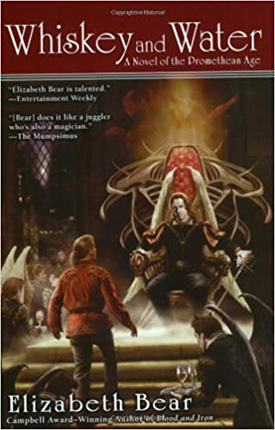 The nice thing about reading the first volume to a really good new fantasy series is that when you reach the end, you know the story’s not over. The nice thing about getting your hands on the second volume is that now the waiting is over.
The nice thing about reading the first volume to a really good new fantasy series is that when you reach the end, you know the story’s not over. The nice thing about getting your hands on the second volume is that now the waiting is over.
Whiskey and Water picks up the story of the war between the Prometheans and Faerie seven years after the climactic battle and the appearance of the dragon Mist, mother of all, in Times Square. Matthew Szczegielniak, the Promethean Mage who discovered the treachery of the Archmage and betrayed her in turn, is still the protector of New York City, although he’s lost everything else: his brother, his faith, and, it seems, his magic. Jane Andraste, the Archmage, pays his bills. They don’t communicate.
And on All Hallows Eve, a young woman is murdered by a Fae. Jane Andraste smells a chance to do away with the treaty that keeps her from pursuing her war — that’s the legal restraint, at least. The more practical one is that save for her and Matthew, the entire Promethean Club was wiped out, although she has found apprentices. By the terms of the treaty, the matter should be turned over to the Daoine Sidhe, but the killer, it seems, is not one of the Medb’s subjects.
Bear has taken the opportunity in this second installment of her series The Promethean Age to expand her universe. The same elements are there, and many of the same characters — Elaine, now the Medb; Keith MacNeill, the Dragon Prince, now in Hell in payment of the teind, the tribute paid by the Courts of Faerie to the Morningstar; the Morningstar himself, Lucifer (and now we meet his brothers Satan and Christian); Matthew, wounded in magic and body, not to mention his soul; Carel, the Merlin; Whiskey, the Kelpie, who now carries Elaine’s soul and wants to see her unthroned; Fionnghuala, the swanmay, Whiskey’s aunt, who might as well have been MacNeill’s godmother for all her care of him. They are joined by a bard whose name is not Thomas but Christopher and who knows the Prometheans too well; Detectives Donall Smith and Ernie Peese, the former with some power of his own, the latter with the power of his faith; Michael, who doesn’t seem to want to leave off the original War in Heaven. There are others, some making their first appearances, some taking on slightly different roles as the weight of various components shifts in this part of the story.
We see somewhat more of Jane Andraste, and Bear brings more emphasis to the Christian myths — Hell, the various devils, the archangel Michael and her relationship with Peese. Don’t take this to mean that you’re going to find a lot of standard Judaeo-Christian imagery here: like any good storyteller, Bear has no compunctions about bringing her own vision to the elements she appropriates. She’s digging a little deeper into these people and into their worlds and bringing them in line with her universe, which I think goes a long way toward making this installment as enthralling as Blood and Iron. She also plays with identities here — Michael is a young woman and also the archangel of the flaming sword; Christian, the youngest of the devils, seems to take on whatever identity suits his needs of the moment. It goes beyond mere shapeshifting and it affects more characters than those two, and while it may unsettle some readers, I was intrigued and delighted.
In fact, “intrigued and delighted” more or less sums up my reaction to Whiskey and Water as a whole. Don’t think of it as a sequel, because it’s not: it’s the next part of the story, and just as rich, magical and poetic as its predecessor.
And now, of course, although all the ends seem to have been found and neatly tied off, I’m hoping for another one.
(Roc, 2007)
